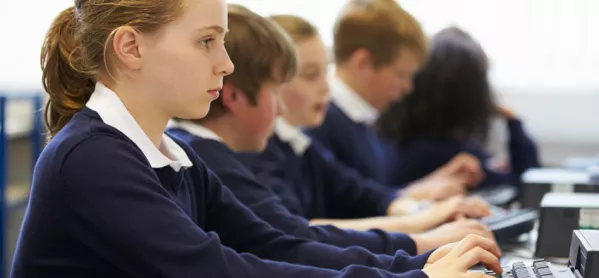Students who use computers “very frequently” at school do worse when it comes to achievement than those who use them rarely, international research has shown.
The study also shows that countries that have spent heavily on computer equipment have seen “no noticeable improvement” in reading, maths and science over the past 10 years.
The findings were published in a report released today by the Organisation for Economic Co-operation and Development, which produces the hugely influential Programme for International Student Assessment (Pisa) rankings.
It comes just days after ministers expanded the new behaviour tsar Tom Bennett’s remit to take in the impact of smartphones and other handheld devices on classroom behaviour.
According to the research, the UK has the third lowest ratio of of students to school computers among the 34 OECD countries, meaning that only Australia and New Zealand have more computers per student. However, the UK failed to make the top 20 when it came to students’ aptitude in maths, science and reading: the most recent Pisa tests placed it at 26th, 21st and 23rd respectively out of a list of 65 countries and administrations.
According to the study, the UK has 1.4 computers to every student, half that of Shanghai, China, which came top in every Pisa test in 2012.
In his foreword to the report, Andreas Schleicher, OECD director for education and skills and the man who runs the Pisa tests, says that where computers were used by teachers, their impact on student performance was “mixed at best”.
“Students who use computers moderately at school tend to have somewhat better learning outcomes than students who use computers rarely,” Mr Schleicher writes. “But students who use computers very frequently at school do a lot worse in most learning outcomes, even after accounting for social background and student demographics.
“The results also show no appreciable improvements in student achievement in reading, mathematics or science in the countries that had invested heavily in ICT for education.”
And he adds that the “most disappointing” finding of the study is that technology is “of little help” in closing the skills divide between the disadvantaged students and their wealthier peers.
The report prompted England’s ICT subject association, Naace, to call for better investment in teacher training to utilise technology more effectively.
“There will be cases in the UK where schools have bought technology like it’s the latest fashion item because the next door school has bought it without changing their pedagogy in order to get the most out of it,” Mark Chambers, Naace’s chief executive, said.
“But we have to ask why technology is not having an impact that it should be having. We have to ask why schools are not getting the most out of their equipment.”




